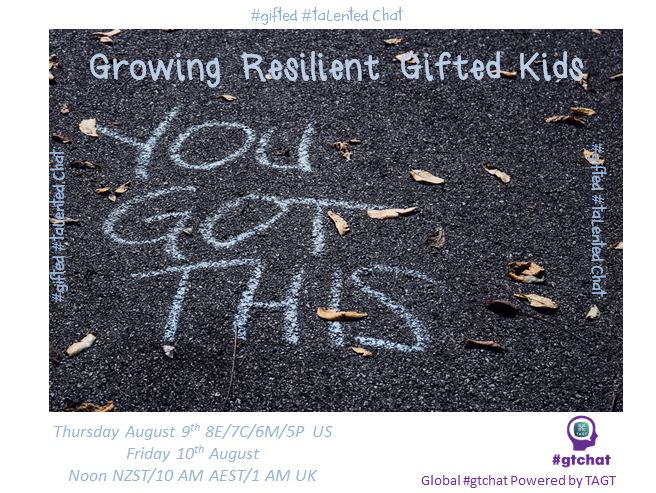
How do you define ‘resilience’? This week at #gtchat we discussed what resilience means for gifted children. It refers to protective factors which buffer a person’s response to stressful situations or significant life events. Resilience isn’t fixed. It changes due to circumstances over one’s lifespan. It involves optimism (believing in yourself), persistence (in the face of potential failure), and becoming a good problem solver.
Characteristics often common to gifted children and those children considered resilient include task commitment, a desire to learn, and reflectiveness as well as the ability to dream. Common characteristics of gifted children and resilient children may also include self-control, self-awareness or even risk-taking. In recent years, research has shown that high intelligence contributes to greater resilience. (Bonanno 2004)
Resilience plays a role in the life of 2E students. Twice-exceptional students must deal with others’ perceptions of how ability should influence achievement. Failure to meet those expectations can negatively affect 2E students. These students who may be at higher risk not to develop resilience and be successful could counter risk factors with a network of support from caring and nurturing adults.
Teachers can nurture academic resilience in the classroom by providing an environment where students feel safe and respected. They can act as role models for students by keeping emotions in check around students and encouraging positive interpersonal relationships. Teachers can encourage students to read books about courage in the face of adversity.
Parents can build resilience at home by expressing positive attitudes in difficult situations; displaying emotions such as love, gratitude, and hope; and providing a long-term caring relationship with their child. When young children face an untenable situation, parents can brainstorm with them to understand what is happening and how they might develop a plan to overcome the problem. Parents also need to realize the importance of relinquishing control over their child’s life and allow the child to experience ‘agency’ – being able to solve problems on their own; to take control of their own life’s narrative.
How can we integrate mindfulness, gratitude, and empathy into children’s busy lives? Mindfulness, gratitude and empathy are powerful factors in developing resilience in children and adults need to provide the necessary time to allow them to be integrated into their child’s life. Encourage children to express gratitude when good things happen in their lives and empathy for others who may be having experiences which they haven’t had. Resilience trumps failure and adults can serve as role models who exhibit mindfulness, gratitude and empathy in everyday tasks and when responding to the needs of their children.
We encourage you to view the transcript of this chat which can be found at Wakelet. Then, check out the resources below for more information.

Global #gtchat Powered by the Texas Association for the Gifted and Talented is a weekly chat on Twitter. Join us Thursdays at 8E/7C/6M/5P in the U.S. and Fridays at Noon NZST/10 AM AEST/1 AM UK to discuss current topics in the gifted community and meet experts in the field. Transcripts of our weekly chats can be found at Wakelet. Our Facebook Page provides information on the chat and news and information regarding the gifted community. Also, checkout our Pinterest Page and Playlist on YouTube.
 About the author: Lisa Conrad is the Moderator of Global #gtchat Powered by TAGT and Social Media Manager of the Global #gtchat Community. She is a longtime advocate for gifted children and also blogs at Gifted Parenting Support. Lisa can be contacted at: gtchatmod@gmail.com
About the author: Lisa Conrad is the Moderator of Global #gtchat Powered by TAGT and Social Media Manager of the Global #gtchat Community. She is a longtime advocate for gifted children and also blogs at Gifted Parenting Support. Lisa can be contacted at: gtchatmod@gmail.com
Resources:
Sprite’s Site: Revitalization and Resilience
Sprite’s Site: Best Australian Blogs 2012 Part 6
Sprite’s Site: Surviving the Christmas Season
Teaching Tenacity, Resilience, and a Drive for Excellence: Lessons for Social-Emotional Learning for Grades 4-8 (Prufrock Press November 2018)
Developing Resilience in Gifted Students
“Gifted, Bullied, Resilient: A Brief Guide for Smart Families” with author, Pamela Price
An Overview of Resilience in Gifted Children
How Can I Improve My Gifted Child’s Resilience?
Resilience and Gifted Children
Coping 101: Building Persistence and Resilience in Gifted Children
The Implications of Risk and Resilience Literature for Gifted Students with Learning Disabilities
Enhancing Resilience of Gifted Students (pdf)
UK: Approaches to Measuring Academic Resilience: A Systematic Review (pdf)
Using Mindfulness-Based Strengths Practices with Gifted Populations (pdf)
Management of Anxiety Begins at Home
Cybraryman’s Critical Thinking Page
Cybraryman’s Learning from Mistakes Page
Cybraryman’s Coping Strategies Page
Cybraryman’s Social and Emotional Learning Page
Cybraryman’s Risk Taking and Innovation Page
Wikipedia: Four Stages of Competence
AUS: Building Resilience in Children
Nurturing Gratitude in Kids 365 Days a Year
Photo by sydney Rae on Unsplash
Graphic courtesy of Lisa Conrad